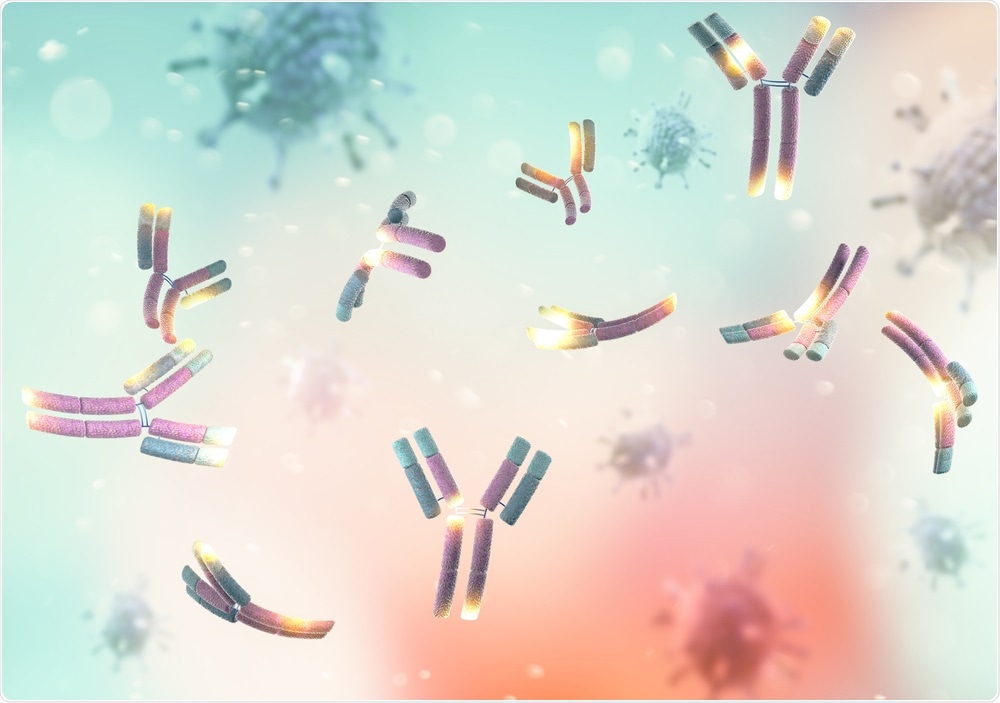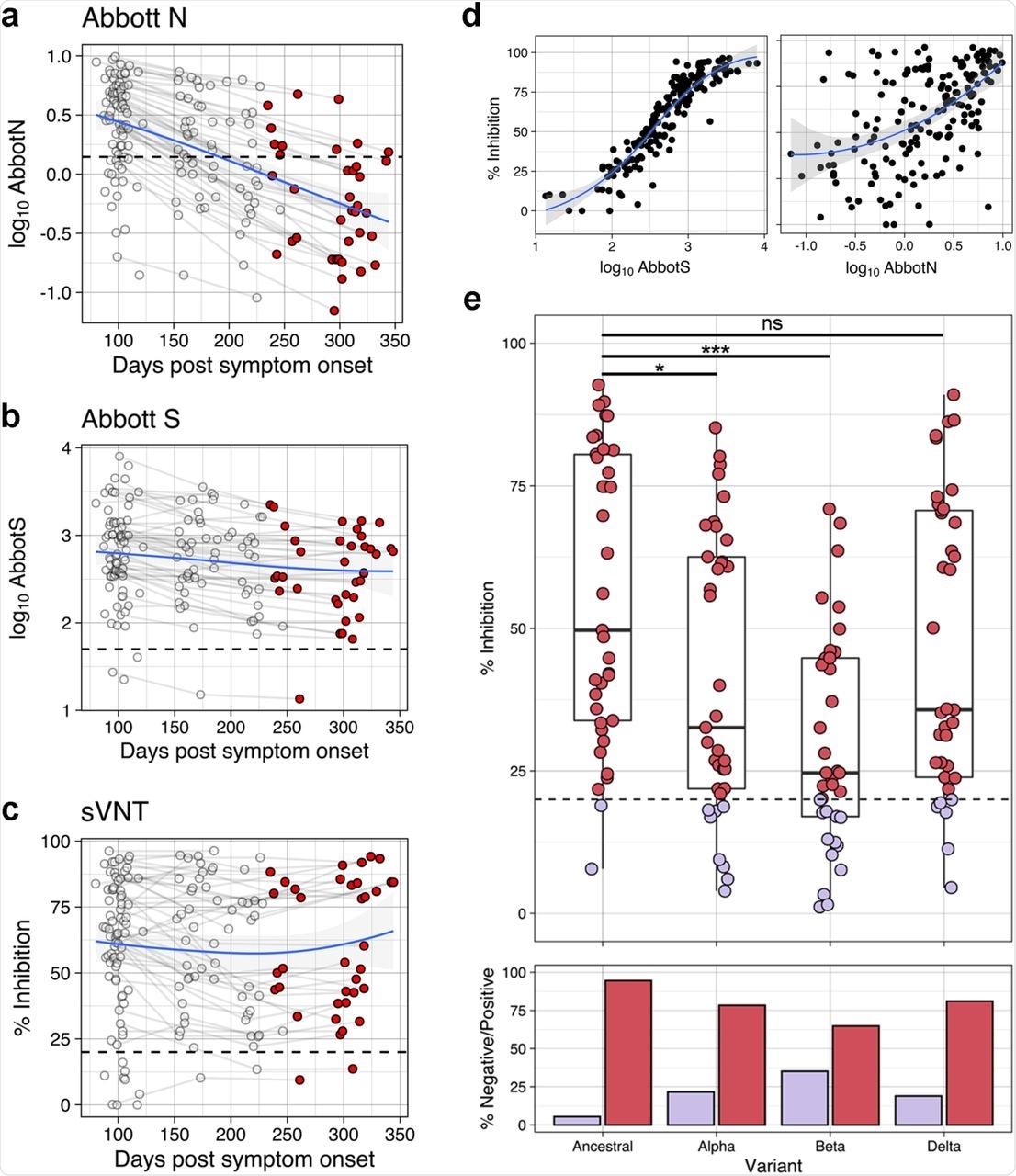A cohort study conducted in New Zealand (NZ) has found that antibodies to the severe acute respiratory syndrome coronavirus 2 (SARS-CoV-2) spike protein, as well as neutralizing antibodies to both the ancestral strain and the Delta variant, remain relatively stable between eight and eleven months post-infection. The study, which is published on the preprint server medRxiv*, suggests that long-lived antibody responses can be generated from a single natural infection event.
 Study: The persistence of neutralizing antibodies up to 11 months after SARS-CoV-2 infection in the southern region of New Zealand. Image Credit: Naeblys / Shutterstock.com
Study: The persistence of neutralizing antibodies up to 11 months after SARS-CoV-2 infection in the southern region of New Zealand. Image Credit: Naeblys / Shutterstock.com
Tracking the immune response following natural infection and vaccination
Following the initial introduction of SARS-CoV-2 in NZ in February 2020, and a community outbreak of 1,154 confirmed cases, this nation successfully eliminated SARS-CoV-2 and remained largely free of coronavirus disease 2019 (COVID-19) cases, until the current outbreak of the Delta SARS-CoV-2 variant.
The emergence of SARS-CoV-2 variants of concern (VOCs), combined with reports of the gradual waning of antibodies over time, highlighted a need to study and track the immune responses generated after natural infections and vaccination. The need to monitor these immune responses has become particularly warranted since the initial waves of infections and because currently licensed vaccines are based on the ancestral SARS-CoV-2 strain, rather than the Delta variant, which is now dominating infections globally.
Recent reports have suggested that neutralizing antibody levels are an important correlate of protection. Therefore, these efforts have stimulated intense efforts on understanding how mutations within the receptor-binding domain (RBD) in a SARS-CoV-2 VOC might impact neutralizing antibody activity and protection from re-infection.
The researchers of the current study present a follow-up serological assessment of polymerase-chain-reaction (PCR)-confirmed cases nearly one year post-infection, including levels of neutralizing antibodies to the Alpha, Beta, and Delta VOCs.
About the study
During the first COVID-19 wave in NZ, a cohort of 78 PCR-confirmed COVID-19 cases, infected between November 3, 2020, and May 4, 2020, was recruited in the Southern District Health Board region of NZ. Of these, 30 participants donated 37 samples, with a median of 302 days post symptom onset, for the present study.
There were no successive community outbreaks during the study timeframe, nor had any participants received a COVID-19 vaccine. Therefore, immune responses represented a single exposure event tracked over the time course.
Antibodies to both SARS-CoV-2 nucleocapsid (N) and spike (S) proteins were assayed. At the same time, neutralizing antibodies to the Alpha (B.1.1.7), Beta (B.1.351), and Delta (B.1.617.2,) VOCs were assessed using a surrogate Viral Neutralization test (sVNT) that is based on the receptor-binding domain (RBD) of the spike protein corresponding to the sequence for each of these variants.
 Antibody responses following SARS-CoV-2 infection over time| Antibody responses targeting Nucleocapsid (N) protein (a), Spike (S) protein (b) as well as neutralizing antibodies (c) over time. New donations are indicated by red circles with previously reported donations indicated by unfilled circles (n=172). (d) Correlation between S protein antibodies (left) and N protein antibodies (right) vs neutralizing antibodies. LOESS regression (blue line) was used to visualize general trends in antibody levels, and standard error of regression is indicated by grey shaded area (n=172). (e) Neutralizing antibody responses to variants of concern including only the latest donations (represented by red circles in a-c) (top). Kruskal- Wallis test showed a significant difference (p<0.001) with follow up Wilcoxen test Holm adjusted p-values indicated by stars, *p<0.05, ***p<0.001 (n=37). Percentage of samples below (purple) and above (pink) the assay cut-off (bottom). Dashed horizontal lines represent respective test cut-offs throughout.
Antibody responses following SARS-CoV-2 infection over time| Antibody responses targeting Nucleocapsid (N) protein (a), Spike (S) protein (b) as well as neutralizing antibodies (c) over time. New donations are indicated by red circles with previously reported donations indicated by unfilled circles (n=172). (d) Correlation between S protein antibodies (left) and N protein antibodies (right) vs neutralizing antibodies. LOESS regression (blue line) was used to visualize general trends in antibody levels, and standard error of regression is indicated by grey shaded area (n=172). (e) Neutralizing antibody responses to variants of concern including only the latest donations (represented by red circles in a-c) (top). Kruskal- Wallis test showed a significant difference (p<0.001) with follow up Wilcoxen test Holm adjusted p-values indicated by stars, *p<0.05, ***p<0.001 (n=37). Percentage of samples below (purple) and above (pink) the assay cut-off (bottom). Dashed horizontal lines represent respective test cut-offs throughout.
Study findings
In a previous report on the same cohort, the researchers observed that IgG antibody responses to the viral spike protein and neutralizing antibodies were relatively stable over an eight-month period post-infection compared with antibodies to the nucleocapsid protein.
The team, in the present study that includes later time-points, confirms the relative stability of the spike antibodies compared to the nucleocapsid antibodies. Nucleocapsid antibodies declined rapidly between 8-11 months, with 73% samples below the cut-off at this later time-point. This contrasted with the spike antibodies, where 97.3% of samples remained positive at the later time-point.
Likewise, neutralizing antibodies to the ancestral SARS-CoV-2 strain also showed no decline at this later time point, with 94.6% remaining positive. This trend was also reflected in the strong correlation between spike and neutralizing antibodies, which was not observed with nucleocapsid antibodies.
The sVNT assay demonstrated a significantly reduced neutralization capacity to the Beta variant compared with ancestral strain with a median inhibition of 24.7% versus 49.7%, respectively, and a significant, but less marked, reduction to the alpha variant at 32.6%. In contrast, there was a non-significant reduction to the Delta variant of 35.7%. This trend was mirrored in the proportion of samples below the assay cut-off, with the Beta strain showing the highest proportion of negative samples at 35.1%, compared with the Alpha and Delta strains at 21.6% and 18.9%, respectively.
Confirming that the Beta variant evades the humoral immune response
These data conform to other studies, where the Beta variant appears to evade humoral immunity to a greater extent as compared to the Alpha and Delta variants. This immune escape is partly determined by the E484K mutation in the Beta RBD that interferes with antibodies generated in response to ancestral strain sequences.
In contrast, the Delta variant does not contain this critical escape mutation but is instead associated with increased transmissibility due to gains in replication efficiency. The persistent levels of neutralizing antibodies to the Delta variant following ancestral strain infection bodes well for vaccination with the ancestral spike protein sequences being administered in NZ and around the world.
Long-lived antibody responses can be generated from a single natural infection event
In the absence of re-exposure, antibody reactivity to the viral spike protein, as well as neutralizing antibodies, remained relatively stable between 8 and 11 months post-infection.
“However, given the risks of serious disease associated with SARS-CoV-2 infection, vaccination is still strongly recommended.”
*Important notice
medRxiv publishes preliminary scientific reports that are not peer-reviewed and, therefore, should not be regarded as conclusive, guide clinical practice/health-related behavior, or treated as established information.
- McGregor, R., Craigie, A., Jack, S., et al. (2021) The persistence of neutralizing antibodies up to 11 months after SARS-CoV-2 infection in the southern region of New Zealand. medRxiv. doi:10.1101/2021.10.26.21265501, https://www.medrxiv.org/content/10.1101/2021.10.26.21265501v1
Posted in: Medical Science News | Medical Research News | Medical Condition News | Disease/Infection News | Healthcare News
Tags: Antibodies, Antibody, Assay, Coronavirus, Coronavirus Disease COVID-19, Immune Response, immunity, Mutation, Polymerase, Protein, Receptor, Respiratory, SARS, SARS-CoV-2, Severe Acute Respiratory, Severe Acute Respiratory Syndrome, Spike Protein, Syndrome, Vaccine

Written by
Namita Mitra
After earning a bachelor’s degree in Veterinary Sciences and Animal Health (BVSc) in 2013, Namita went on to pursue a Master of Veterinary Microbiology from GADVASU, India. Her Master’s research on the molecular and histopathological diagnosis of avian oncogenic viruses in poultry brought her two national awards. In 2013, she was conferred a doctoral degree in Animal Biotechnology that concluded with her research findings on expression profiling of apoptosis-associated genes in canine mammary tumors. Right after her graduation, Namita worked as Assistant Professor of Animal Biotechnology and taught the courses of Animal Cell Culture, Animal Genetic Engineering, and Molecular Immunology.
Source: Read Full Article
